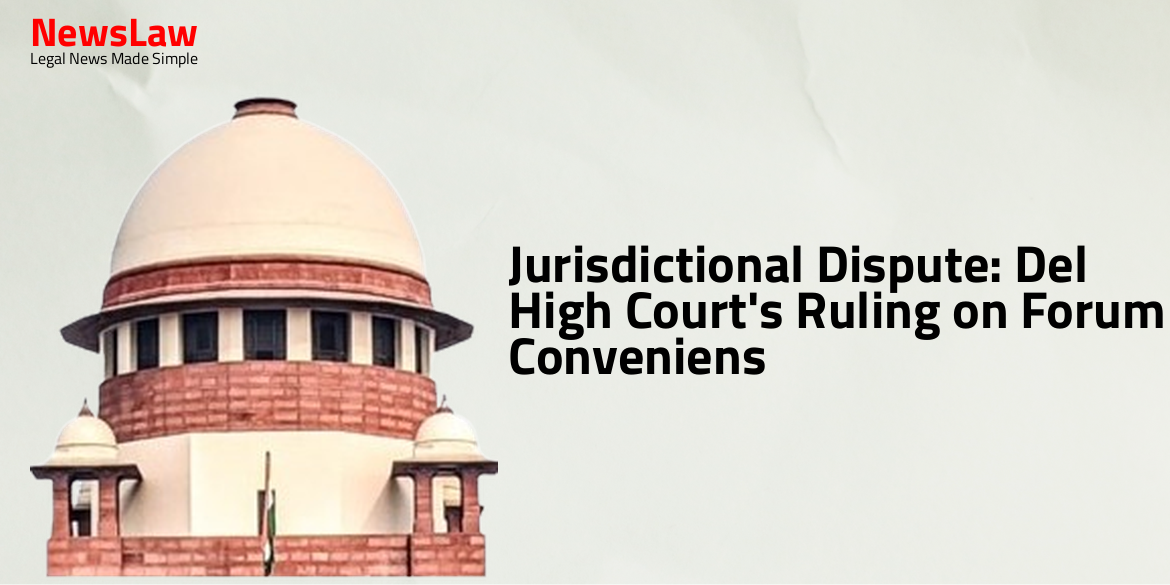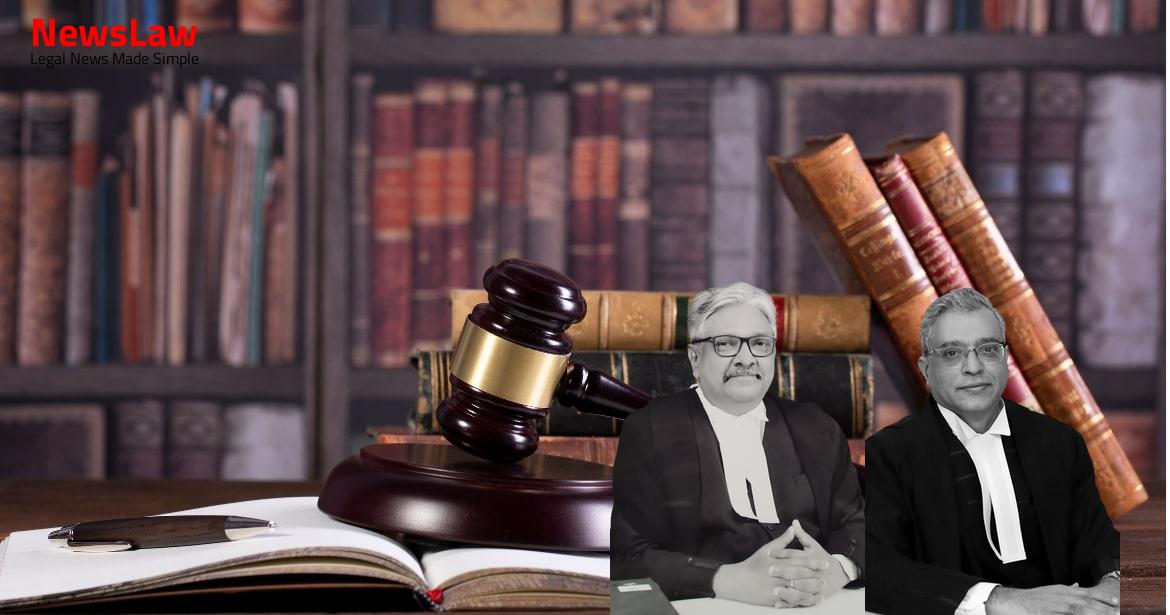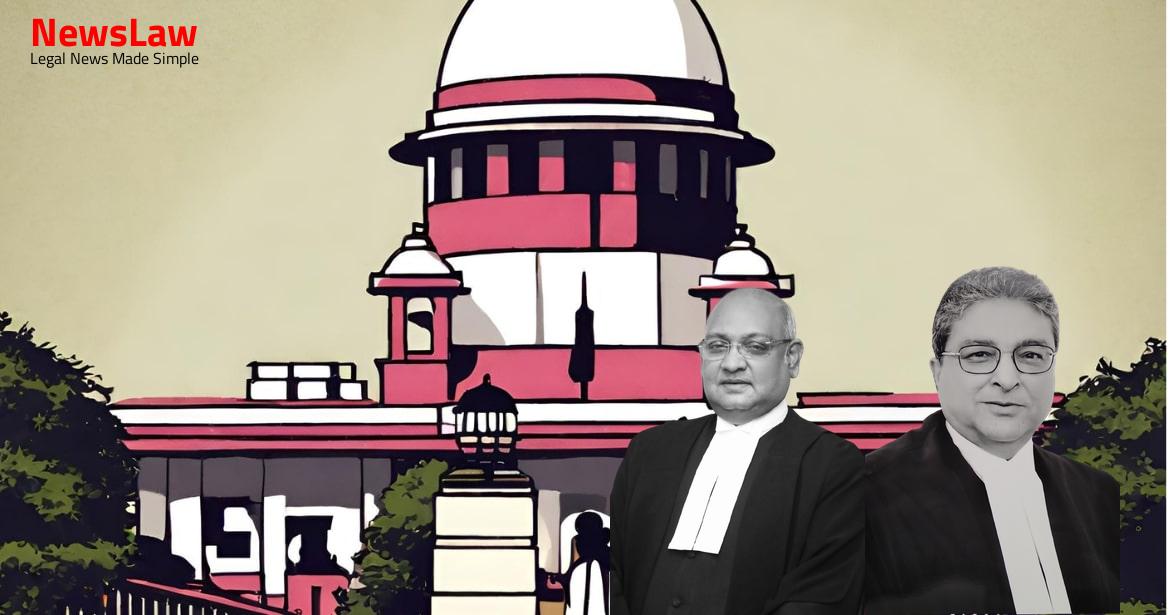Explore the nuanced legal analysis conducted by the court regarding the interpretation of Constitutional provisions in relation to multi-member Wards in Municipalities. This summary delves into the complexities of the case, shedding light on the implications of the court’s decision on local governance and the empowerment of marginalized groups within the framework of municipal elections.
Facts
- The appellant filed a writ petition challenging the vires of certain provisions of the Gujarat Provincial Municipal Corporation Act, 1949.
- Various reliefs were claimed in the writ petition, including declarations of certain rules and notifications as ultra vires the Constitution of India.
- The State Election Commission was directed to initiate the process of holding elections for local bodies immediately.
- Orders and notifications issued by the State of Gujarat were also challenged in the writ petition.
- The appellant sought a stay on the election process due in October 2015 for Municipality in the State of Gujarat.
- Cooperation and assistance, including provision of necessary police force, were requested to ensure free and fair elections.
- A mandamus was sought for the State Election Commission to declare the dates for holding Panchayat elections in Gujarat.
- Writ Petition(C) No. 786 of 2020 challenged notifications determining the number of seats in provincial corporations in Gujarat.
- Prayed for a declaration declaring Section 5(3)(iii)(a) and 29A of Act, 1949 as unconstitutional.
- Division Bench concluded that Section 15(1) of the Gujarat Panchayats Act must be read down for the Election Commissioner to initiate election process at least 45 days prior to term expiry.
- Failure to initiate elections in advance can be challenged under Article 226 of the Constitution.
- Section 7A of GPMC Act, Section 8A of Municipalities Act, and Section 257 of the Act brought by Ordinance No. 3 of 2015 were held unconstitutional and void.
- The Division Bench dismissed the writ petition as issues were covered by an earlier judgment.
Also Read: Analysis of Seniority Determination in Armed Forces Personnel Case
Issue
- The issue at hand is whether having more than one representative from a Ward negates the empowerment of weaker sections, specifically women, Scheduled Castes, and Scheduled Tribes.
- Another related issue is whether the State Government could have issued a notification dated 04.12.2014 before the expiry of thirty days after the draft rules for amendment of Bombay Provincial Municipal Corporations (the delimitation of wards and allocation of reserved seats) Rules, 1994 were issued on 27.11.2014.
Also Read: Analysis of Circumstantial Evidence in Criminal Conviction
Arguments
- Constitution does not provide for thematic mode and manner of election to Lok Sabha and Rajya Sabha.
- Lok Sabha members are elected by direct election, while Rajya Sabha members are elected by indirect election.
- Article 243S mandates only one member to be elected from one Ward in Municipal Corporation, not allowing for more than one member from the same Ward.
- State Legislature has the power to make laws concerning representation in a Municipality, but cannot violate constitutional principles.
- Reservation of seats for SC/ST and women must be seat-wise, not ward-wise, as per Article 243T.
- The Municipal Laws in Bombay provide for one representation from one Ward, while in Gujarat, multi-member Wards exist.
- The literal interpretation should apply when the words in the Constitution are clear.
- Multi-member representation from a Ward goes against the principle of empowering marginalized groups and women.
- Article 243R does not mandate a multi-member Ward, and the composition of Municipalities is governed by it.
- Article 243R and Article 243S of the Constitution of India were analyzed to determine if they limit the number of members from one Ward.
- The question of whether there should only be one member from one Ward was raised.
- The legality of provisions in various acts and rules such as Sections 5(3)(iii)(a), 29A of the Gujarat Provincial Municipal Corporations Act, 1949, and Rules related to delimitation of wards and allocation of reserved seats were questioned.
- The argument was made that these provisions might be ultra vires to Articles 243R and 243S of the Constitution.
- Both the petitioner and respondent cited judgments of the court in support of their arguments.
- The submissions of learned counsel for the parties revolved around the above questions and legal provisions.
Also Read: Interstate Prisoner Transfer: Court’s Legal Analysis
Analysis
- The legislative power of Parliament and State Legislatures as listed in List I, List II, and List III of Seventh Schedule are subject to the provisions of the Constitution.
- The composition of the Municipality is dealt with separately by Article 243R, and the provisions of Article 243S do not apply or intend to limit the composition of the Municipalities.
- Sub-article (4) of Article 243S pertains to the Chairperson of the Wards Committee, and there is no limitation on the number of members representing a Ward.
- The notification dated 04.12.2014 concerns the determination of the number of Wards and Councilor seats reserved for Scheduled Castes, Scheduled Tribes, and women, not related to the earlier notification of 27.11.2014.
- The State Legislature has the power to make provisions for all matters related to elections to Municipalities under Article 243ZA, which includes the election of Chairpersons in multi-member Wards.
- The reservation of seats in Municipalities is meant to empower weaker sections like women, Scheduled Castes, and Scheduled Tribes for effective participation and voice in governance.
- Contrary to the argument presented, having multiple representations from one Ward does not undermine the empowerment of weaker sections, but rather enhances their presence and participation.
- The rules relating to the allocation of seats in Wards Committees and Municipalities provided by the State legislation do not contradict the constitutional provisions under Article 243S, allowing for compliance with both sets of regulations.
- Article 243ZG(a) may be read as allotment of more than one seat to one constituency, but it can encompass the numbers of Wards and Seats in a specific way.
- Rule 2(b) defines ‘Chairperson’ as the person elected by members of the Wards Committee as the Chairperson of that Committee.
- The legislative competence of the State Legislature is circumscribed by express prohibition contained in the Constitution itself.
- The provisions of Part IXA of the Constitution relevant for the case are Articles 243P, 243R, 243S, 243ZA, and 243ZG.
- Challenges are laid against Section 5(3)(iii)(a) and Section 29A of the Act, 1949, regarding the delimitation of wards, allotment of seats, and composition of Wards Committees.
- Rules 4 and 5 of Bombay Provincial Municipal Corporations Rules, 1994, relate to the delimitation of wards, allocation of reserved seats, and multi-member wards.
- Article 243ZG, 243S, and 243R of the Constitution deal with delimitation of constituencies, composition of Wards Committees, and Municipalities.
- Article 243R specifies that all seats in a Municipality shall be filled by persons chosen by direct election from territorial constituencies.
- Article 243ZA governs elections to the Municipalities, ensuring direct elections as per the requirements of the Constitution.
- When interpreting a legislative entry, it should be construed broadly to include all related matters
- Laws made by Parliament and State Legislatures must comply with the Constitution
- Inconsistency between two statutes should be determined based on direct conflict, intention, and field of operation
- The power of State Legislatures to enact laws is plenary unless expressly limited by the Constitution
- State laws inconsistent with constitutional provisions cease to operate unless amended or repealed
- Provisions of Section 5(3)(iii)(a) and Section 29A of the Act, 1949, along with Rules of 1994 and 2007, are not ultra vires to Part IXA of the Constitution.
- Division Bench of the High Court was correct in dismissing the writ petition filed by the appellants.
- No merit found in Civil Appeal arising from SLP(C) No. 24950 of 2015 and Writ Petition (C) No. 786 of 2020.
Decision
- The State Election Commission was directed to initiate the process of holding the election of the local bodies immediately.
- The tenure of the Local Body formed based on the High Court’s direction dated 21.10.2015 has ended, making the issue raised in the appeal unnecessary to address.
- Appeal dismissed as it has become infructuous due to the end of the local body’s tenure.
- Elections for the local bodies were conducted in November/December 2015 per the High Court’s decision dated 21.10.2015.
- The appeal was filed against the Gujarat High Court’s ruling dated 21.10.2015 that allowed the writ petition filed by the respondents.
- The High Court declared the State Election Commission’s postponement of the local bodies’ elections as illegal and set it aside.
- The Division Bench found Ordinance No.3 of 2015 unconstitutional and void.
- The directions issued by the High Court have been implemented, rendering the appeal moot.
Case Title: PARMAR SAMANTSINH UMEDSINH Vs. STATE OF GUJARAT (2021 INSC 115)
Case Number: C.A. No.-000706-000706 / 2021



